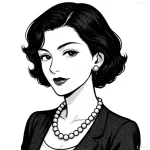“The true nature of elegance, culture, and all the aesthetic things humans conceive is barren and inorganic.”

- January 14, 1925 – November 25, 1970
- Born in Japan
- Novelist, playwright, critic, political activist
Japanese
「優雅、文化、人間の考える美的なもの、そういうものすべての実相は不毛な無機的なものなんだ。」
English
“The true nature of elegance, culture, and all the aesthetic things humans conceive is barren and inorganic.”
Explanation
In this quote, Mishima presents a cynical view of beauty, culture, and elegance. He argues that what humans consider to be aesthetic or elegant is, in its essence, sterile and lifeless. Elegance and culture, often seen as the pinnacles of human achievement, are here described as inorganic—devoid of life or genuine vitality. Mishima’s perspective challenges the romanticized view of beauty and culture as something deeply connected to the human spirit, suggesting instead that they are empty and artificial constructs that do not possess the true vitality of life itself.
This critique may reflect Mishima’s broader philosophical beliefs, where he often contrasts the impermanence and flesh-and-blood reality of human life with the abstract or constructed ideals of aesthetic beauty. He implies that the pursuit of beauty or culture often leads to a disconnection from life—a movement toward the abstract, disembodied, and detached aspects of existence, rather than the vibrant, raw essence of human experience. In Mishima’s view, true beauty or culture should not be seen as an idealized, static thing, but something that is alive, organic, and connected to the realities of existence.
In modern terms, this quote could be seen as a critique of contemporary consumerism and the pursuit of perfection in aesthetics and culture, where the search for beauty often focuses on shallow, external qualities rather than the depth and authenticity of life. It serves as a warning against the empty pursuit of ideals that are disconnected from reality, urging us to question whether the beauty we create and admire is truly vibrant or simply a facade that hides a more hollow truth. Mishima’s words ask us to reflect on the nature of what we consider beautiful or cultured and to reconsider whether these ideals reflect the true vitality of life or simply a sterile, detached version of it.
Would you like to share your impressions or related stories about this quote in the comments section?


